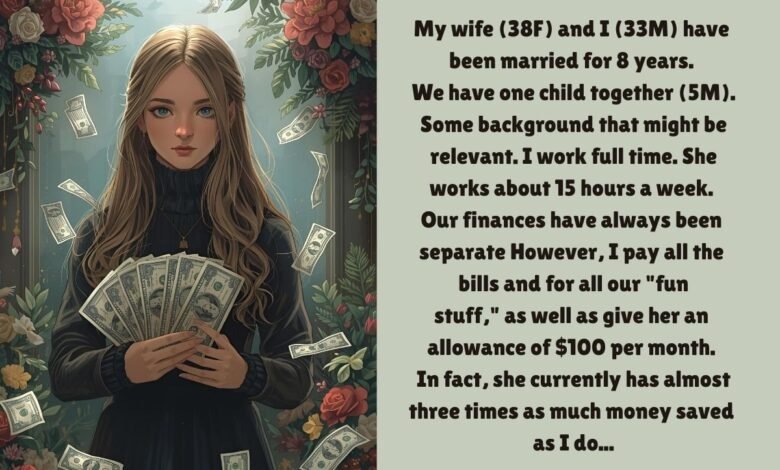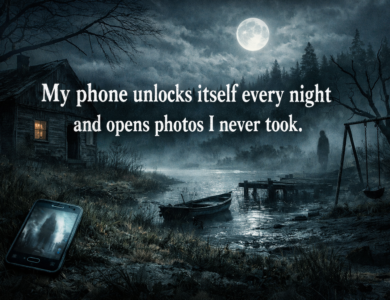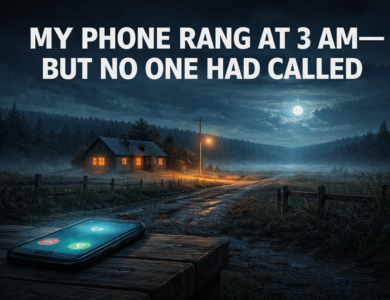
I pay all the bills, raise our kid, and still had to ask twice for an iced Americano.
We’ve been married eight years. I’m 33, she’s 38. We have a five-year-old and wildly different work habits. I clock in full-time while she works maybe 15 hours a week—by choice.
Our finances are separate. Always have been. I cover the mortgage, utilities, groceries, insurance, daycare—everything. She keeps her income for “extras.” That’s the agreement. I even give her $1,000/month as fun money.
She’s saved up way more than me. But last week, I asked her to grab me a $2 coffee on her way home. Simple.
She forgot.
Next day? I asked again. She said, “Maybe later.” But later never came.
By the third day, I was dead tired, hadn’t had a real break in weeks, and yeah—I lost it a little. I told her it wasn’t about the coffee. It was about the fact that she couldn’t be bothered.
She said I was “keeping score.” That I was “controlling” and that I “shouldn’t expect favors just because I pay for things.”
Then she asked if I wanted to talk to a therapist.
But before I could even respond, she did something I never saw coming—
She packed a small bag, grabbed her laptop, and said she was going to stay at her sister’s for a few days “to cool off.”
It felt surreal. Over coffee?
No. It wasn’t about coffee either. I knew that.
She left without kissing our son goodbye. Just told me not to “poison his mind” while she was gone.
The first night was tough. My son kept asking where mommy went. I told him she needed a little break, and he nodded, too young to understand. But even he sensed something was off.
The second night, I opened the shared photo album on my phone. I hadn’t looked at it in months. Mostly filled with pictures of our son, birthdays, park days, Halloween costumes. Then I noticed something odd—some recent uploads I didn’t recognize.
They were from a few weekends ago when she said she was “at a yoga retreat.” In one, she was clinking wine glasses with some guy I didn’t know. In another, they were on a boat. Laughing. Her hand on his thigh.
I sat there, phone trembling in my hands, heart pounding in my chest. I told myself not to jump to conclusions.
So I scrolled back. Started noticing more patterns.
She used to sync everything to our cloud album without thinking. And honestly? I hadn’t paid much attention before. But now, with clearer eyes, I saw the same man appear over and over in group shots. Always nearby. Always smiling too much.
I didn’t want to believe what it looked like. So I waited. Let her cool off. Let myself cool off.
When she came back three days later, she acted like nothing had happened. Tossed her bag on the couch, said, “We need to talk.”
I nodded.
She said she wanted us to go to therapy. That she wasn’t happy. That I was “emotionally unavailable.” That I “treated her like a houseguest, not a wife.” That I never “surprised her with flowers” or “asked about her day.”
I listened.
And then I asked her one question: “Are you seeing someone else?”
She blinked. Too long.
Then came the rehearsed denial. “What? No. I can’t believe you’d even ask me that.”
So I showed her the photos.
Her face fell. Not shock. Not guilt. Just annoyance. Like I’d caught her cheating on a diet.
“That’s just a friend. You’re reading too much into it,” she said.
But I didn’t argue. I just nodded. “Okay.”
I didn’t sleep that night. I stayed up, thinking about the eight years I’d poured into this marriage. All the bills. All the diapers. All the times I said “it’s fine” when it wasn’t.
The next morning, I made two decisions.
First, I made an appointment with a therapist—just me.
Second, I called a lawyer.
Now, here’s where it gets weird. And honestly? A little karmic.
The lawyer I found—through a buddy at work—offered a free consultation. So I went. Told him everything. Showed him the financial breakdown. The photos. The text messages I’d since pulled from our shared laptop (she never signed out of her account).
He leaned back in his chair and said, “You’ve got a very solid case here. She’s not entitled to spousal support. In fact, based on what you’ve shown me, she might owe you.”
My jaw nearly hit the floor.
Turns out, because she barely contributed financially, didn’t work full-time, and likely cheated (based on the digital trail), she wasn’t in a strong position at all.
“But I don’t want to take her for everything,” I told him.
He nodded. “You don’t have to. But you need to protect yourself and your son.”
That night, I cooked dinner like usual. My wife sat at the table, scrolling her phone, barely acknowledging me. Our son chattered about his day, blissfully unaware.
I told her we needed to talk after bedtime.
When he was finally asleep, I sat her down and laid it all out. Calmly. No yelling. Just facts.
“I know about the guy. I saw the messages. I talked to a lawyer.”
She didn’t cry. She didn’t scream. She just looked…bored.
“So what do you want?” she asked.
“I want a divorce.”
She scoffed. “Good luck raising him without me.”
That’s when I told her I’d be seeking primary custody. That I had documentation showing I did the majority of the caregiving, managed all household responsibilities, and had proof of her infidelity.
Her face finally changed. She went pale. “You can’t do that. You’re trying to punish me.”
“No,” I said. “I’m trying to protect myself and our son.”
The next few weeks were a blur. Papers filed. Mediation dates set. She tried to play the victim, but it didn’t stick. Too much digital evidence. Too many receipts. And when she realized she wasn’t walking away with half my income, her tone changed.
Suddenly she wanted to “work it out.” Said she was “confused” and “scared.”
But I wasn’t. Not anymore.
Here’s the twist though.
A few months later, after she’d moved into a tiny apartment with mismatched furniture and no dishwasher, she reached out. Not to argue. Not to apologize.
She asked if I could help her find a full-time job.
Turns out, the “friend” she’d been seeing had ghosted her once he realized she wasn’t getting a big settlement.
She was stuck.
I thought about it long and hard.
And then I told her: “I’ll help you. But not for you—for our son.”
We sat down, made a schedule, agreed to co-parenting rules, and for the first time in years, we were honest with each other.
She admitted she’d resented me for “making things look easy” while she struggled with her identity after becoming a mom. That she thought I didn’t need anything, not even a $2 coffee, because I never asked for help. That the guy made her feel “seen” in a way I hadn’t.
And yeah, it hurt to hear. But I respected the honesty.
Since then, things have actually improved—not as a couple, but as co-parents.
Our son is thriving. He’s in kindergarten now and has two loving homes. We split time 60/40, and she’s finally working full-time again. She even started picking him up early some days so I can rest.
Last week, out of the blue, she handed me a coffee when I came to drop him off.
Just a simple iced Americano.
I looked at her. She shrugged. “Thought you might need it.”
I smiled and said thanks.
It wasn’t forgiveness. But it was peace.
Here’s what I learned: Sometimes, the little things do matter. A $2 coffee isn’t just a drink—it’s a gesture. A way of saying, “I see you. I care.”
If you’re in a relationship and you find yourself keeping score, ask why. And if the other person always seems to forget your needs, maybe it’s time to stop reminding them—and start reminding yourself what you deserve.
Life has a funny way of balancing things out. What you tolerate teaches people how to treat you. But what you walk away from? That teaches you who you are.
If this story resonated with you, hit that like button and share it with someone who needs to hear it.
You never know who’s waiting for their own $2 coffee.
Read More: Lessons from Across the Street







